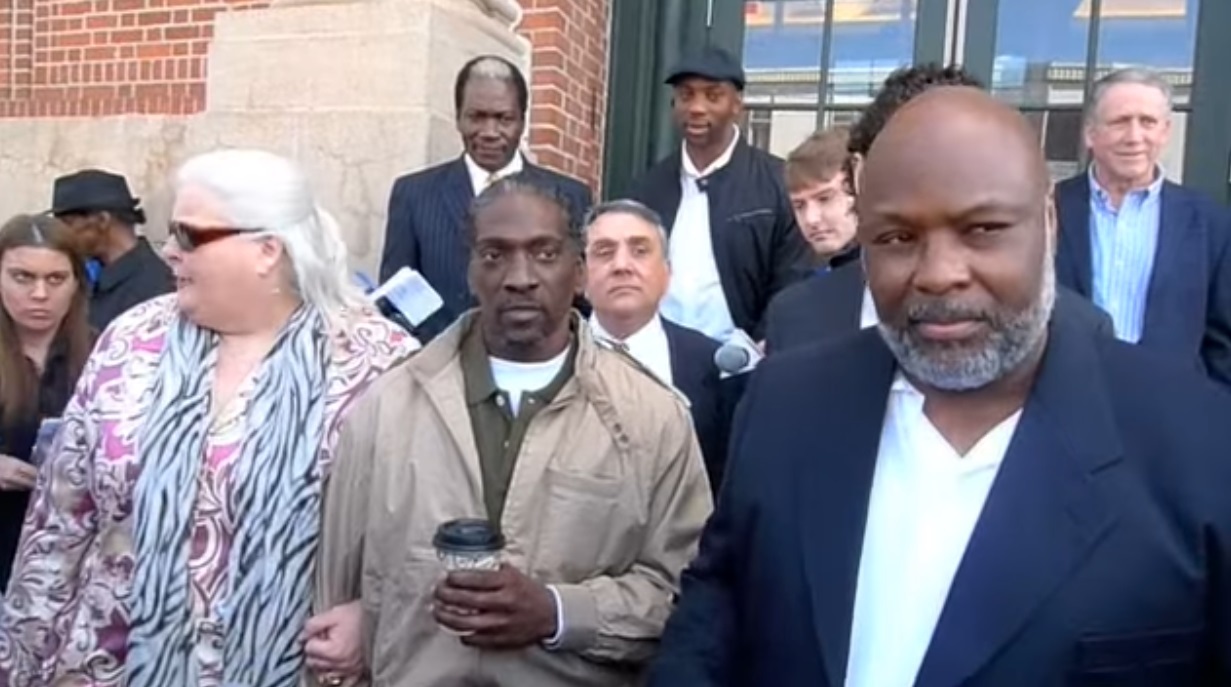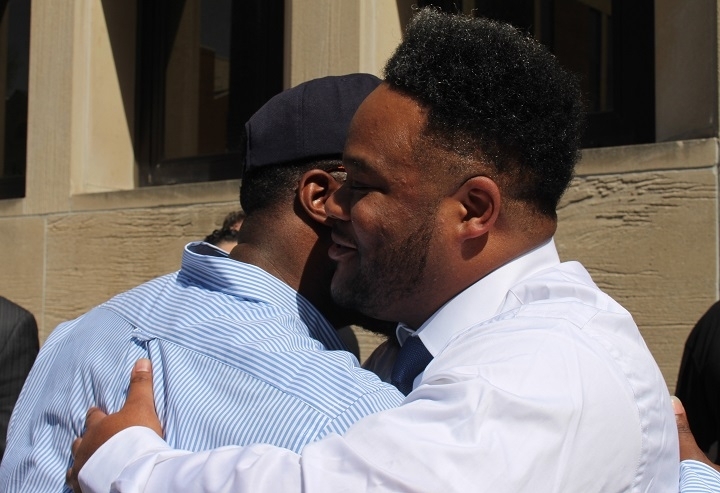
Thomas MacMillan file photo
George Gould (right), with the late Ronald Taylor (center): Now suing the city for wrongful conviction.

Thomas Breen file photo
Marquis Jackson (right) and Vernon Horn: One big step closer to trial for their wrongful-conviction suit.
Bribes of heroin. Threats of arrest. Hours of interrogating a sex worker convulsing from opioid withdrawal.
One year after his exoneration for a 1993 murder, George Gould is suing the city, along with individual police officers, for allegedly using those tactics to coerce the testimony that sent him to prison for a murder he didn’t commit.
Gould spent a total of 26 years in prison, until he was able to walk free with a shortened sentence in 2021 — and eventually, when New Haven State’s Attorney John Doyle moved to vacate his conviction, with a cleared name in 2024.
He is now suing the City of New Haven as well as eight former detectives (or their estates): Keith Wortz, Brian Sullivan, Leroy Dease’s estate, Percy Gethers’s estate, Daniel Gleason, Gil Burton, Stephen Coppola, Edwin Rodriguez, Matthew Merced, and Otoniel Reyes.
Gould and his lawyers filed the lawsuit on June 11, two days after an appeals court decided that a separate lawsuit against the city and police officers over the wrongful convictions of Vernon Horn and Marquis Jackson could move forward. Read more about that lawsuit below.
Gould and his co-defendant, Ronald Taylor, were convicted on charges connected to the murder of Eugenio Vega inside Vega’s Grand Avenue bodega on July 4, 1993. (A jury acquitted them of the murder in 1995, but convicted them of felony murder — a different charge than murder — and robbery in the first degree, attempted robbery in the first degree, and conspiracy to commit robbery in the first degree.)
Vega was found in the early morning at his store, La Casa Green, inside a walk-in cooler with his hands tied together by an electric cord. He had been shot once in the head. Police found an open safe and an empty wallet in the bodega.
Decades later, two relatives would tell the FBI that Vega’s son had confessed to them that he’d murdered his own father.
In the meantime, however, police decided to contact a Fair Haven sex worker deep into a heroin addiction, who had testified in prior cases. She initially told police that she did not have information about Vega’s murder, according to Gould’s lawsuit — until police arrested her for prostitution.
They interrogated her for hours, she would later describe, while she was undergoing severe heroin withdrawal. She would later say that they offered to take her to buy heroin as soon as she gave them the statement they wanted. That as the prospect of being jailed for prostitution loomed, police even threatened to arrest her for the murder. The interrogation led her to give the sole piece of “eyewitness testimony” tying Gould and Taylor to the crime. Police found no physical evidence connecting the two suspects to the murder.
The sex worker eventually recanted her testimony at Gould’s first habeas trial — a recantation elicited by a public defense investigator, Gerry O’Donnell, who was later himself convicted of bribing her to recant. She verbally took back her recantation to detectives in 2011, though just over two weeks later, she refused to sign a written transcription of those remarks; she has maintained since then that her original trial testimony against Gould and Taylor was false.
At the very trial against O’Donnell for bribing her recantation, she maintained that her testimony against Gould and Taylor had been coerced, according to a state Conviction Integrity Unit report. She stated:
“Okay. At that time — I think I told you earlier about my drug habit. I was on the street for thirteen years, nowhere to live. I lived in cars, vans, abandoned houses. I lived — I had nowhere to go. My life was so hard. When New Haven Police Department picked me up and brought [me] to the detective bureau — when I was starting to go through withdrawal, I had been there so long from being questioned. They bought drugs for me. They bought me clothes; they took me out to eat. They took care of my needs and made it easy for me to just keep going on with that lie. I know it doesn’t sound right now, I can see that, but then I was out of — I couldn’t reason with reality. I had no — and I was sick, and I just couldn’t think right. I couldn’t think right. I don’t know how else to put it.”
In 2010, more than halfway through his 26 years behind bars, Gould tasted one year of freedom after winning a habeas trial. The state won its appeal, however, and he went back to prison in 2011, where he would remain until a judge cut his sentence short in 2021. Three years later, after a re-investigation of the case, Doyle’s motion to vacate prompted Gould’s formal exoneration.
Taylor, meanwhile, died of cancer in 2011, before his name could be cleared.
In a statement, city communications associate Ali Oshinskie wrote, “The City of New Haven has just received the lawsuit and will look into all allegations thoroughly. As this is a case from several decades ago, it will take some time to review. The City is committed to proceeding in good faith.”
Detectives' "Qualified Immunity" Appeal Dismissed
Such lawsuits can take years to unfold, as two other exonerated New Haveners — Vernon Horn and Marquis Jackson — know all too well.
Horn and Jackson were convicted — and eventually exonerated — of charges related to a robbery-turned-murder at a deli in 1999. They each spent 19 years in prison until a reinvestigation uncovered nearly 140 pages of phone records found inside the home of retired assistant chief Petisia Adger, a former detective assigned to the case. The phone records had not been released to Horn and Jackson’s lawyers, and they contradicted the state’s evidence against Horn and Jackson. The pair walked free from prison in 2018.
That same year, Jackson and Horn filed a joint lawsuit against the City of New Haven and four former detectives involved in their convictions: Petisia Adger, Leroy Dease (now represented by his estate executor), Daryle Breland, and James Stephenson.
Nearly seven years later, their lawsuit has not yet gone to trial. Years of pretrial disputes have delayed the process.
On June 9, the Second Circuit Court of Appeals issued an order rejecting detectives’ efforts to get the lawsuit thrown out — meaning that a trial for Jackson and Horn’s lawsuit appears to finally be on the horizon.
The detectives had sought to challenge the very basis of the lawsuit by claiming that they were protected by qualified immunity — a legal principle that shields police officers and other government employees from being held personally liable in civil suits, so long as their actions are deemed to have been “reasonable” and so long as they did not violate a “clearly established” constitutional right.
In raising this challenge, the detectives bore the legal burden of proving that they were protected by qualified immunity. Connecticut District Court Judge Robert Chatigny ruled against them, stating that their arguments rested upon disputed facts — that it is a jury’s responsibility to determine the veracity of those facts at trial, and not within a judge’s purview to throw out the case before those facts are decided. After the detectives appealed this ruling, the Second Circuit Court of Appeals sided with Judge Chatigny in a June 9 summary order.
So, finally, the case is back in the district court’s hands, with a trial likely to be scheduled. The detectives have the option of raising a qualified immunity defense later on in the trial process.
On behalf of the city, Oshinskie wrote in a statement, “While this case heads to a trial and arguments before a jury, we cannot comment on a pending case. The City of New Haven is committed to proceeding in good faith as we await the finding of a jury.
The state, meanwhile, recently awarded Horn and Jackson approximately $5 million each as compensation for their wrongful convictions.
“Mr. Horn waited decades to be exonerated,” said Nicholas Bourland, a lawyer representing Horn as part of the New York City-based firm Emery Celli Brinckerhoff Abady Ward & Maazel LLP. “He filed the suit in 2018. He has waited years upon years … only to see this trial that he’s been waiting for to be delayed by meritless motions.”
Bourland argued that the case speaks not only to destructive actions by individual officers, but to a broader culture and system within the New Haven Police Department at the time of the case.
“They had a policy, custom, and practice of allowing widespread witness coercion and suppression of exculpatory evidence, and we’re confident that the evidence will support that,” Bourland said. “This isn’t about rogue officers. This is about a rogue police department.”
Read More…
• George Gould
- Gould’s legal complaint.
- The state Conviction Integrity Unit’s report on Gould’s case.
- Coverage of Judge Stanley Fuger’s 2010 decision reversing Gould’s conviction; Gould’s first release from prison; and his return to prison after exoneration appeal.